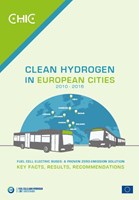
Today, the fuel cell electric bus project Clean Hydrogen in European Cities (CHIC) has launched its final project report entitled “fuel cell electric buses: a proven zero emission solution. Key facts, results, recommendations” at the International Zero Emission Bus Conference in London, City Hall.
The report is intended to guide cities and bus fleet operators in understanding the reality of operating fuel cell buses today, based on the intensive learnings and results of the CHIC project. It also contains information about the environmental analysis and the social study results, and suggests some hints and options for the development of commercial strategies for the deployment of fuel cell electric buses.
CHIC is a six year flagship zero emission bus project that deployed a fleet of fuel cell electric buses and hydrogen refuelling stations in cities across Europe and at one site in Canada. The project will end in December 2016 and has successfully proved that fuel cell electric buses can offer a functional solution for cities to decarbonise their public transport fleets, improve their air quality and lower their noise levels.
The deployment of fuel cell electric buses does not come without challenges associated to costs, technical availability of the buses and regulations/regulatory barriers. The report provides recommendations on how these challenges can be overcome through action by bus operators, technology providers and regional and national policy makers. The brochure is aimed at all stakeholders in the zero emission bus sector, particularly cities and operators interested in deploying fuel cell buses in the near future.
Additional information for cities and operators is available on a newly launched website dedicated to fuel cell electric buses: www.fuelcellbuses.eu.
Kerstin K. Müller, Daimler Buses - EvoBus GmbH, coordinator of the CHIC project: “We are very proud of the achievements of CHIC. The project has proven that fuel cell electric buses are far from being a research project and are ready for commercialisation. The brochure is a good guideline that provides insights for new comers in the sector. It gathers the knowledge accumulated in the CHIC project and we hope that it will prove to be a valuable tool for anyone who is interested in the deployment of fuel cell electric buses.”
The European Public Private Partnership FCH JU Executive Director Bart Biebuyck commented: “CHIC is an FCH JU flagship project and we are extremely proud to see that it did contribute to the commercialisation process of this technology. Thanks to CHIC, 26 fuel cell electric buses have been deployed throughout Europe driving public transport straight towards a new sustainable system. We need to further inform publics about fuel cell buses’ benefits and raising awareness in that respect is crucial. For this reason, the FCH JU is delighted to see the publication of the new CHIC report which is an excellent material to further communicate not only on the projects’ achievements but also to show the way for similar new initiatives.”
About CHIC
The CHIC project started in 2010 and will run through to December 2016. CHIC involves 23 partners from 8 countries. In total, 54 fuel cell electric buses have been operated within the project in daily service: The FCH JU has co-funded 26 buses and their infrastructure in Aargau (CH), Bozen (IT), London (UK), Milan (IT) and Oslo (NO). Cologne and Hamburg (DE) operate an additional fleet of 8 busesthrough separately funded programs. In addition, 20 buses were deployed in Whistler (Canada). On top of the 54 fuel cell buses, 4 hydrogen internal combustion engine (ICE) buses operated in Berlin until 2014.




Comments
There are no comments yet for this item
Join the discussion